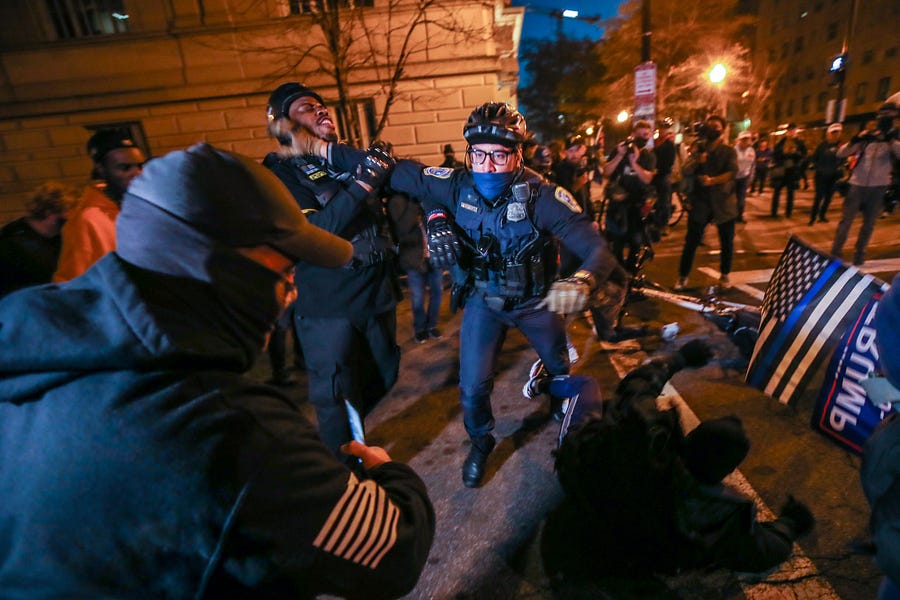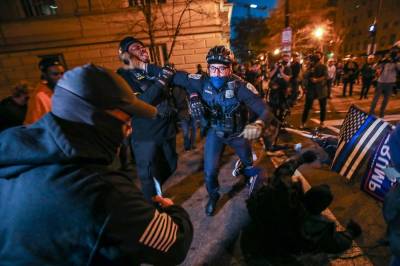As many feared, after President Joe Biden was inaugurated, a mob unleashed destruction. They stormed the Democratic party headquarters. They spray-painted “[expletive deleted] Biden!” and smashed the Democratic HQ’s windows. One sign read, “We don’t want Biden, we want revenge!”
Federal law enforcement used tear gas to repel the gangs of anti-democratic goons unwilling to accept the lawful verdict of voters.
But here’s the thing: The bloodthirsty goons weren’t MAGA-hat wearing Trumpists, but members of Antifa, and the protests weren’t in Washington, D.C., but in Portland and Seattle.
Now, I don’t bring this up to score partisan “What about Antifa?” points. The violence at the Capitol on January 6 was uniquely despicable, not merely for the American carnage it unleashed but also for its intent. The goal was to override the Constitution and install an unelected demagogue as president. Destroying businesses and beating innocent people is always evil, but it is a profound category error to pretend that the sins of “one side” cancel out the sins of the other.
Rather, I think it’s important to point out the violence and mayhem in response to Biden’s election from—you pick the label—left-wing or anarchist hooligans because it illustrates how facts on the ground don’t always fit neat, tidy us-versus-them demagoguery.
During the hothouse summer of riots, racial protests, and armed anti-lockdown demonstrations, a common talking point among Donald Trump supporters was that antifa and Black Lives Matter rioters were in effect the military wing of the Democratic Party. “These are Biden voters, these are Democrat voters, that are out there doing this,” Donald Trump Jr. insisted in September.
“Over the weekend, we saw exactly what [ruling liberal elites] will excuse from their own supporters,” Tucker Carlson of Fox News proclaimed in July. “Armed mobs of Joe Biden voters torched buildings, smashed cars, attacked police officers. They rioted. They hurt people, a lot of people.”
After the election, radio host Mark Levin tweeted, “Notice, there are no post-election riots because the media have declared Biden the next president, and Biden declares himself president. So, most of the looters, arsonists, rioters were, in fact, pro-Biden voters.”
It seems likely, as a matter of gross generalization, that some of the rioters and looters associated with Black Lives Matter protests preferred Biden to Trump. After all, Trump’s record on race and police misconduct is not exactly the sort of thing that would attract people protesting racial inequity and police abuse to his banner.
It’s also worth noting that as a candidate, Biden unequivocally condemned violence in ways Trump did only after he faced a second impeachment for helping to inspire the assault on the Capitol.
Meanwhile, it should go without saying, given Antifa’s anti-Biden protests in the wake of his inauguration, that they were never “Biden voters” in the first place.
There’s a lesson here for both parties. We live in a time when each side in our polarized society is desperate to cast light on the very worst actors of the other side and proclaim, “See, this is what all of them are like.” Left-wingers focus on neo-confederates, QAnon nutters, and other goons and say, “This is who the Republicans are!” Right-wingers take dead aim at Antifa or (real or alleged) BLM-inspired arsonists and looters and shout, “This is who the Democrats are!”
Politicians make this all the easier when they refuse to draw bright lines between themselves and the bad actors they’re associated with, fairly or otherwise. When Biden denounced rioting and violence, Trump defenders parsed every syllable in search of evidence he didn’t really mean it. Biden supporters had an easier time with Trump, who told the people ransacking the Capitol, “We love you!”
But the point remains. The obligation to condemn outrageous and indefensible behavior falls on those who have the most credibility with those behaving outrageously. It doesn’t matter if it’s unfair that Democrats are tagged with supporting antifa or BLM rioters; it’s in their interest, and the country’s, to either police their own or demonstrate that these people aren’t their own.
Similarly, decent and law-abiding conservatives, including Republican politicians, have every reason to take offense at being associated with the cop killers of January 6. But if they want people to believe there’s no association, they need to be at the forefront of condemning the rioters. Whining about double standards sends the opposite message.
Consistency on such matters is valuable. But credibility starts with cleaning up your own mess first.







Please note that we at The Dispatch hold ourselves, our work, and our commenters to a higher standard than other places on the internet. We welcome comments that foster genuine debate or discussion—including comments critical of us or our work—but responses that include ad hominem attacks on fellow Dispatch members or are intended to stoke fear and anger may be moderated.
With your membership, you only have the ability to comment on The Morning Dispatch articles. Consider upgrading to join the conversation everywhere.